| |
| |
Photographer,
Location |
Images |
Comments |
|
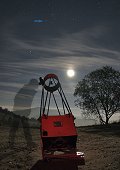
|
Achim
Schaller,
Black Forest, Germany
Oct. 28, 2007 |
#1,
#2, |
Even
with the naked eye we could see the difference between the
stars and the diffuse starlike comet Holmes. Through our
12" Dobsonian telescope, even with the smallest power the
comet was awesome. To take a detailed photo I did put my
Nikon D200 with the tripod on the equatorial platform of
my Dobsonian.
Photo
details: Nikon
D200 (ISO400 30s Exposure) with Tokina 10-17mm Fisheye
at f4 Detail image: Nikon
D200 (ISO 1600, 8 Images stacked, t = 10s each) with
300mm/f5.6 |
|
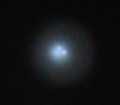
|
Terry Pundiak, M.D.
Easton, PA
Oct. 28, 2007 |
#1 |
Just
in time for Halloween--a Goblin Comet! (See the entry below
for an explanation of Comet Holmes' two "eyes.")
Photo
details: 16 inch
Meade Dobsonian, Nikon
D40x hand held in eyepiece - 1.5 second exposure asa
1600 |
|
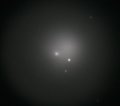
|
Imelda
Joson and Edwin Aguirre,
Woburn, Massachusetts
Oct. 28, 2007 |
#1 |
Nope.
Comet Holmes is not breaking up. The comet was just passing
by a pair of faint background stars. According to Starry
Night Pro 5.0, the star to the right of the psudonucleus
is TYC3334-788-1 (mag. 9.21) while the fainter one below
it is TYC3334-738-1 (mag. 10.84).
Photo
details: 8-inch
f/10 Meade Schmidt-Cassegrain telescope, Canon
EOS 20D digital SLR camera. |
|

|
Dave
Eagle,
Higham Ferrers, England
Oct. 28, 2007 |
#1,
more |
Skies
finally cleared here in England for me to get a view. Easy
naked eye object showing slightly orange hue. Looks more
like a planetary nebula than a comet. Image shows the Moon
taken with the same setup to show how big this strange comet
is. Wonderful. |
|
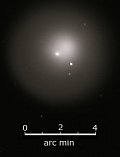
|
Robert
Saint-Jean,
Saint-Bruno, Quebec, Canada
Oct. 28, 2007 |
#1 |
Very
windy and cold but the show was worth it! Several stars
can be seen through the coma. |
|

|
Thomas
Collin,
Trois-Rivières, Québec
Oct. 28, 2007 |
#1 |
These
two photos show that the second nucleus is actually a star.
|


|
Pete
Lawrence,
Selsey, West Sussex, UK
Oct. 28, 2007 |
#1 |
After
a week of cloud, a gap finally appeared and passes over
much of the UK tonight allowing many to get their first
decent glimpse of this amazing comet. This shot is a quickly
composed composite of several different exposures showing
the inner and outer coma. The outer part appears as a misty
green envelope, very noticeable on longer exposures. Some
interesting inner coma detail is also evident on a number
of large telescope runs I did this evening which I'm still
working on. |
|
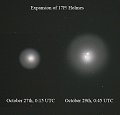
|
Thorsten
Boeckel,
Fuerstenfeldbruck, Bavaria, South Germany
Oct. 29, 2007 |
#1,
more |
The
expansion of the comet since two days in comparision. Since
the 27th of october the diameter grew apprx. 2,5 times.
Phantastic view, but the moon distubance is really hard.
|
|
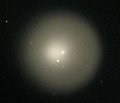
|
Glen
Pidsadnick - Brian Pihack,
Niagara on the Lake Ontario
Oct. 28, 2007 |
#1 |
Photo
details: Power Shot S31S @9:18 f 2.7 iso 100 C-8
|
|

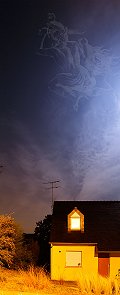
|
Laurent Laveder,
Quimper, Bretagne, France
Oct. 28, 2007 |
#1,
#2, #3,
#4, more |
Yesterday night,
despite some clouds, the Moon and the street lights, the
comet Holmes was perfectly visible, even through the window!
Now, the comet is big enough to be distinguish from stars.
It is still in the Perseus' thigh. It has just move a little
northward from 4 days before. By chance, some droplets of
the same size give me a bright and colorful corona around
the Moon visible not to far from the comet. Two in one!
Photo
details: Canon
30D + Sigma 30mm stop to 4.0 and 70 mm stop to 6.3.
2 s at 400 ISO. |
|
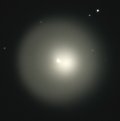
|
Xiang
Zhan,
Beijing Planetarium, Beijing, China
Oct. 28, 2007 |
#1,
more |
It
was very clear in Beijing this day. The comet was very easy
to see in Beijing - such a very big city.
Photo
details: Canon
30D DSLR, Meade
LX200 GPS 16" telescope, ISO 400, 10s, combined with
9 photoes. |
|

|
Greg
Mort,
Ashton Maryland USA
Oct. 26, 2007 |
#1,
more |
The
unusual Comet Holmes looking like an "Electric Dandelion"
a fantastic three dimentional sight unlike any cometary
visitor I've ever seen. |
more
images (Oct. 28): from
P-M Hedén of Vallentuna ,Sweden; from
Alan C Tough of Elgin, Moray, Scotland; from
Efrain Morales of Aguadilla, Puerto Rico; from
John C McConnell of Maghaberry Northern Ireland; from
Glenn Marsden of J.A. Jones Hoober Observatory, Mexborough
& Swinton Astronomical Society; from
Doug Zubenel of De Soto, Kansas.; from
Gary A. Becker of Coopersburg, PA; from
Philippe Moussette of Québec Canada; from
Mila Zinkova of San Francisco, California; from
John Baxter of New Concord, Ohio; from
Frank M. Klicar of Downers Grove, IL; from
John S. Gianforte of Durham, NH; from
Robert Watkins of Cuyahoga Falls, Ohio; from
Don Spain of Little Bear Observatory, Hillview, KY; from
Ari Koutsouradis of Westminster Maryland, USA; from
Charlie Kiesel of Fort Branch, Indiana; from
George Lilley of the K9 Observatory; from
Wayne Baggett of Columbia, Maryland; from
Albino Carbognani of Saint Barthelemy Observatory, Aosta,
Italy; from
Rolando Ligustri of the CAST observatory in Talmassons ITALY;
from Vance Bagwell
of Cedar Hill, Texas;
from
Joe Carr of Observatory Hill, Victoria, BC, Canada;
|
|